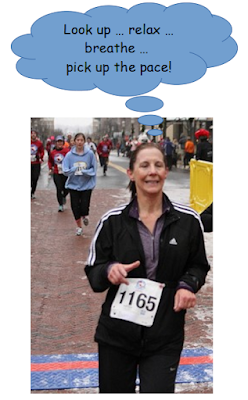Science says... Obviously, during exercise blood pressure and flow increase, sending more energy and oxygen to muscles and organs – including the brain. This means brain performance improves.
“Another explanation for why working up a sweat enhances our mental capacity is that the hippocampus, a part of the brain critical for learning and memory, is highly active during exercise. When the neurons in this structure rev up, research shows that our cognitive function improves … Other recent work indicates that aerobic exercise can actually reverse hippocampal shrinkage, which occurs naturally with age, and consequently boost memory in older adults. Yet another study found that students who exercise perform better on tests than their less athletic peers.”1
2. Mindfulness – This second type of thinking is about connecting to your body. According to Chevy Rough, a mindfulness and performance coach, “It’s purely about being mentally connected within your movement and not being distracted,”2
This type of thinking is most prevalent for me during long runs or races. Often people assume that I try to avoid thinking about how running feels. Instead, if I am running mindfully, I stay in the moment, notice my environs and my physical sensations. I monitor myself:
- My breath – What does my breath tell me about my body? Is it comfortable? Am I mouth breathing?
- My rhythm – Speed up or slow down in response to my breath.
- My eyes – What am I looking at? Is my gaze relaxed, or are my eyes locked on the ground? Lift my eyes and look toward the periphery.
For me, “cloud” thinking usually happens when I’m doing something routine and unambitious – like my daily morning run. My mind wanders, I get lost in random thoughts, and contemplate things that may or may not have any practical benefit. Sometimes I don’t even remember what I was thinking about! This is my favorite way to engage with my “deep strangeness.”
I am not alone. Other people are drawn to “cloud” thinking and willing to invest nearly 50% of their waking hours engaged in it. Why? “For the individual, mind wandering offers the possibility of very real, personal reward, some immediate, some more distant. These rewards include self-awareness, creative incubation, improvisation and evaluation, memory consolidation, autobiographical planning, goal driven thought, future planning, retrieval of deeply personal memories, reflective consideration of the meaning of events and experiences, simulating the perspective of another person, evaluating the implications of self and others’ emotional reactions, moral reasoning, and reflective compassion.”5
Running is my means, not just for fitness and health, but mental rejuvenation, problem solving, and brain stimulation. My mind expands, swerves, and wanders as the miles unfurl...
- https://www.scientificamerican.com/article/why-do-you-think-better-after-walk-exercise/
- https://www.runnersworld.com/training/a22160937/mindfulness-in-running/
- https://www.tandfonline.com/doi/abs/10.1080/1612197X.2015.1069877?journalCode=rijs20
- https://www.thecut.com/2015/08/surprising-power-of-spacing-out.html
- https://www.frontiersin.org/articles/10.3389/fpsyg.2013.00626/full










